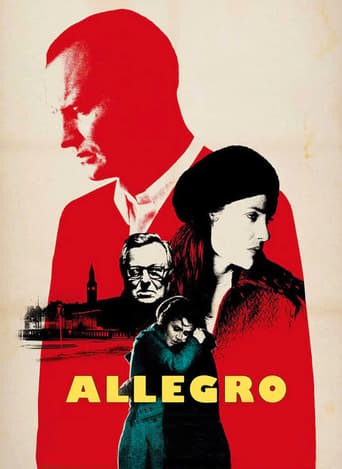franramy
It was a big surprise that I gave this movie. When you think because a photograph is more important than a drawing, in the sense that the picture does capture a moment and freeze-it for all eternity, drawing, photography is made stronger, the film exploits this fact into something dramatically essential to put an omnipotent narrator in the argumentation, which is extremely interesting. Note that does not follow the structure of classical cinema, therefore understanding becomes a challenge, challenge for the viewer who expects to have more elements with which to rebuild those gaps that are present in the argument, leading to an environment discomfort that unfortunately tends to boredom. Ulrich Thomsen's performance manages to articulate a meaning of forgetting how wonderful, considering it's not just forgetfulness, but also, hate, despair and love. In history we find characters that make no sense, that seem to abound, or better yet, seems to be missing something, something like the memories of humans, so variable over time, but strongly tied to the music, which is extremely strong important to understand and feel this film.
mino78
I went out from the cinema crying. The movie, as all movies in my opinion, removes inside you what you let be removed... I am only 28, and yet, this movie reminds me of how many memories I want to hide, forget, just because my life is based on "keep on living, keep on acting as you decided, don't turn back, because this is imperfection". I don't think the movie is excellent, but it has a specific message (art is made of passion and passion is made of each one's history) and it knew how to express it, how to deal with this psychological side each one of us has. Also the music, mainly J.S. Bach, is beautiful. This is the kind of movie that I would call "of the moment", maybe you won't remember it in a few months, but it inspires you and lives with you unconsciously as a psycho therapy does.
Tobias Lynge Herler (www.philm.dk)
Don't hesitate: watch this rare Danish movie, it's anything but typical and a delightful twist of standards in the Danish movie trends of today."Allegro" has this unique story that surprises and wants more than just to amuse and please: this script is simply very well written and surely ends up like nothing you've seen before.This film is anything but boring and one of the highest recommended Danish feature films at the time being!Really challenging and far from typical Danish, great acting and many surprising twists.
tariboventola
Following the Cannes Camera D'or winner, "Reconstruction", Danish director Christopher Boe has made a new unusual film:Allegro Filmed primarily with hand-held camera, the picture is almost as gritty as some Dogme 95-movies. The camera is slightly shaky and keeps fast-zooming at faces all through the movie: Faces are important. Looks are important. Ulrich Thompsen (The Celebration) is the main character, the pianist Zetterstrøm, who is the person, around whom the film centers. Zetterstrøm is not really living life and playing piano, rather he is playing piano and living life through his piano. He is the archetypical introverted person, who lives in his own world, keeping distance to other people and of course love. A chance meeting with a beautiful woman, played by Danish supermodel Helena Christensen, alters his life, but his unbalanced self cannot truly recognize or accept his own feelings, so they part.10 years later - the movies starts. A voice-over by Henning Moritzen (The Celebration, Cries and Whispers) tells us that Zetterstrøm has forgotten about his past, that he is even more secluded from the world of feelings and drawn into perfecting his piano playing. The Voice-over is also a character in the film - Tom, in all probability some fictitious person made by Zetterstrøms own mind. Tom wants Zetterstrøm to retrieve his lost memory. This is the central quest of the film.Materialized in the middle of Copenhagen is The Zone - the area, where Zetterstrøm and the woman parted has now turned into a deserted zone, where people can't enter. The "walls" of the zone can't be entered. The Zone is a picture - something you can see, but not touch. The Zone is Zetterstrøms memory, his past.An abstract story now unfolds, as Tom and his assistant invites Zetterstrøm back to Copenhagen, where he gets the chance of entering The Zone. On a semi-realistic level, Zetterstrøm returns to Copenhagen to play a concert - and this mix of abstraction, materialized psychology and realism continues throughout. --The voice-over is constantly guiding us, but as it is also analyzing the immediate situation for us, we as audience have to think ahead of it; There's more to the film, than the voice-over tells us. The mood is very dark, very abstract - the intro somehow reminds of Bergmans "Persona", although not as Freudian in it's symbols - and the film seems very focused. It has a nostalgic feeling to it - Zetterstrøm wandering alone in a secluded world, as walking in his own self. The symbols are everywhere - symbols of past, symbols of love, symbols of frame of mind. It's very scary, although funny at certain points - the script is done by Danish stand-up comedian and quite intelligent-wise gifted, Michael Wulff (who worked with Boe on an Art House comedy-series called "Kissmeyer Basic"). The humour may be thought of as getting the mood in imbalance one or two times, but otherwise it's quite nice.The acting is superb. Ulrich is playing his favourite kind of role - introverted, mostly quiet and Bill Murray-like, sometimes shouting. His play opposite Helena, making her debut on the big screen, is fabulous - she really has the perfect eyes and voice for this dream-like character. Also Henning Moritzen is perfect as The all-knowing guy, who is teasing us.Not flawless, but this movie is yet an interesting film from the new major upcoming danish film director, Christopher Boe.Highly Recommended: 8/10


